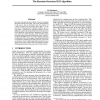Free Online Productivity Tools
i2Speak
i2Symbol
i2OCR
iTex2Img
iWeb2Print
iWeb2Shot
i2Type
iPdf2Split
iPdf2Merge
i2Bopomofo
i2Arabic
i2Style
i2Image
i2PDF
iLatex2Rtf
Sci2ools
143
click to vote
UAI
1998
1998
The Bayesian Structural EM Algorithm
In recent years there has been a flurry of works on learning Bayesian networks from data. One of the hard problems in this area is how to effectively learn the structure of a belief network from incomplete data--that is, in the presence of missing values or hidden variables. In a recent paper, I introduced an algorithm called Structural EM that combines the standard Expectation Maximization (EM) algorithm, which optimizes parameters, with structure search for model selection. That algorithm learns networks based on penalized likelihood scores, which include the BIC/MDL score and various approximations to the Bayesian score. In this paper, I extend Structural EM to deal directly with Bayesian model selection. I prove the convergence of the resulting algorithm and show how to apply it for learning a large class of probabilistic models, including Bayesian networks and some variants thereof.
Related Content
| Added | 01 Nov 2010 |
| Updated | 01 Nov 2010 |
| Type | Conference |
| Year | 1998 |
| Where | UAI |
| Authors | Nir Friedman |
Comments (0)

